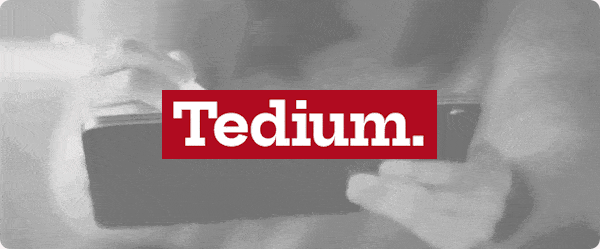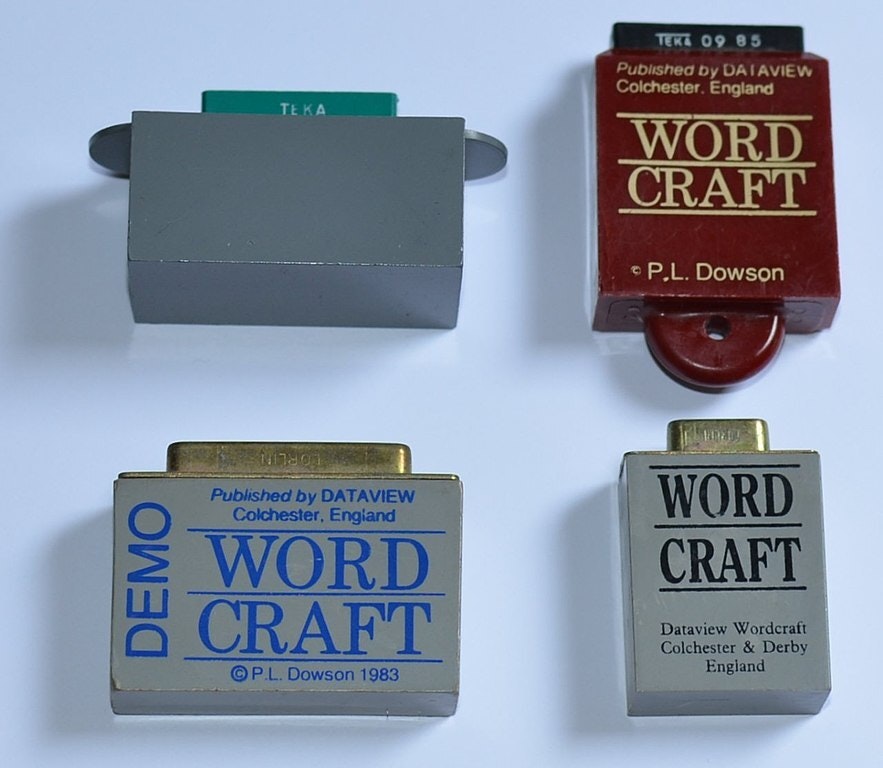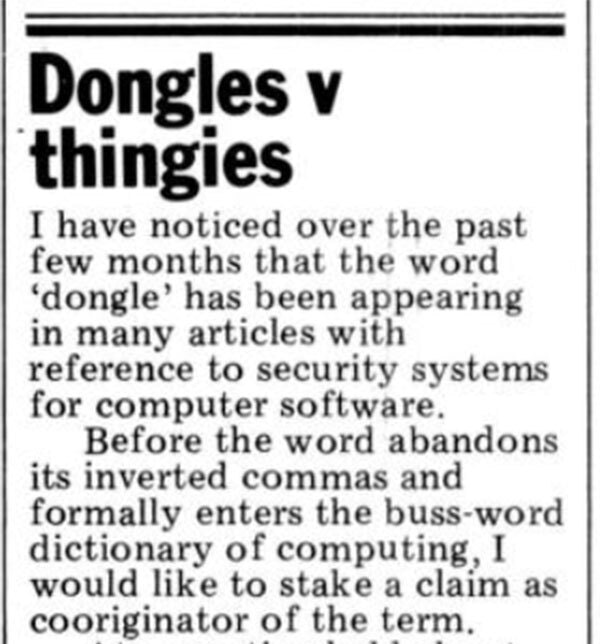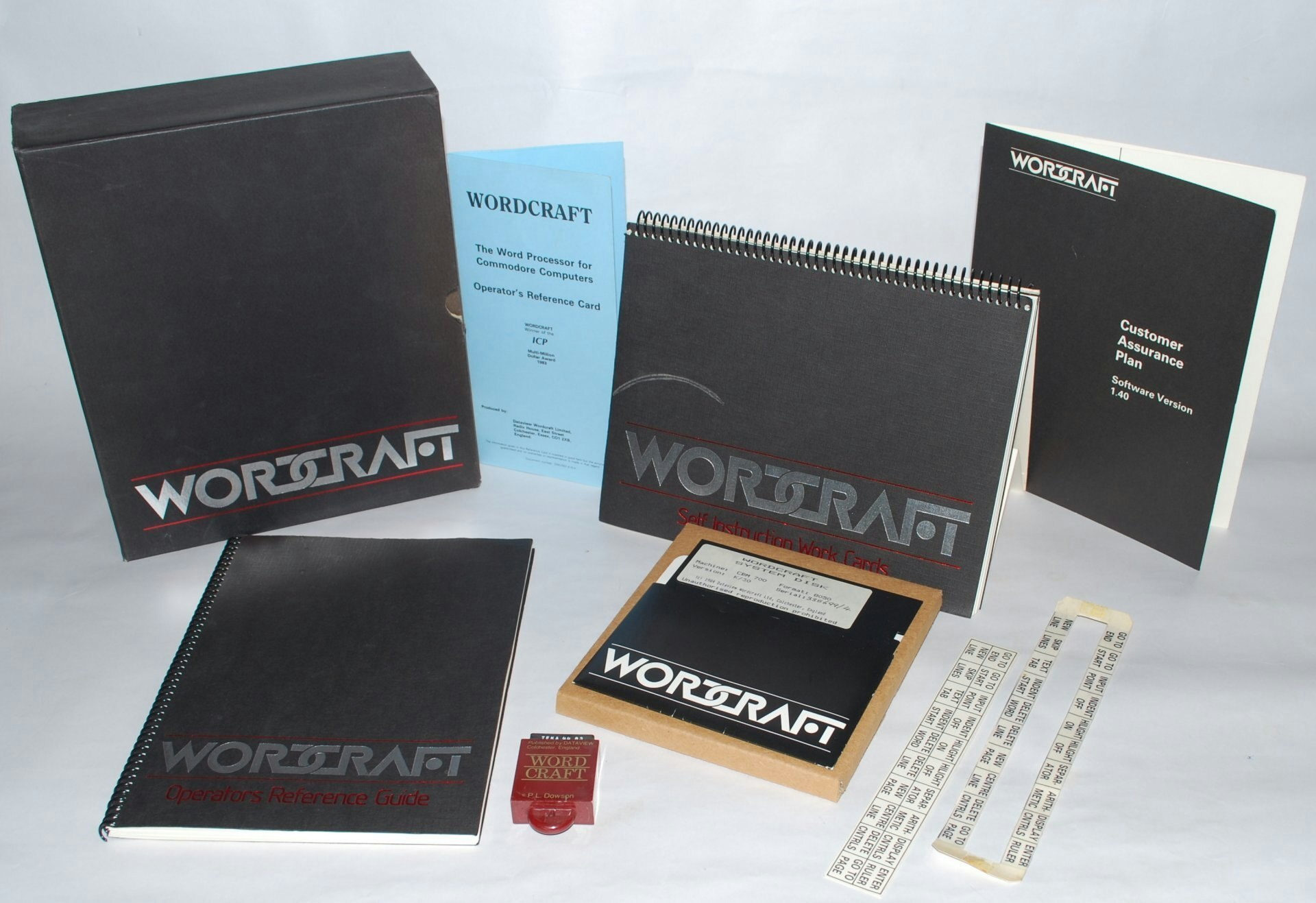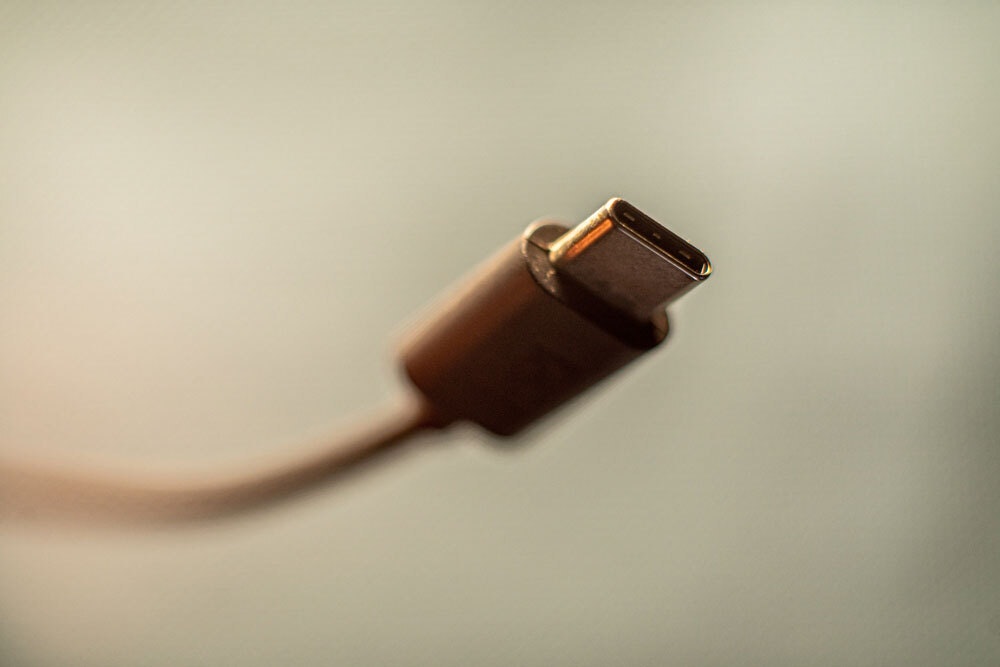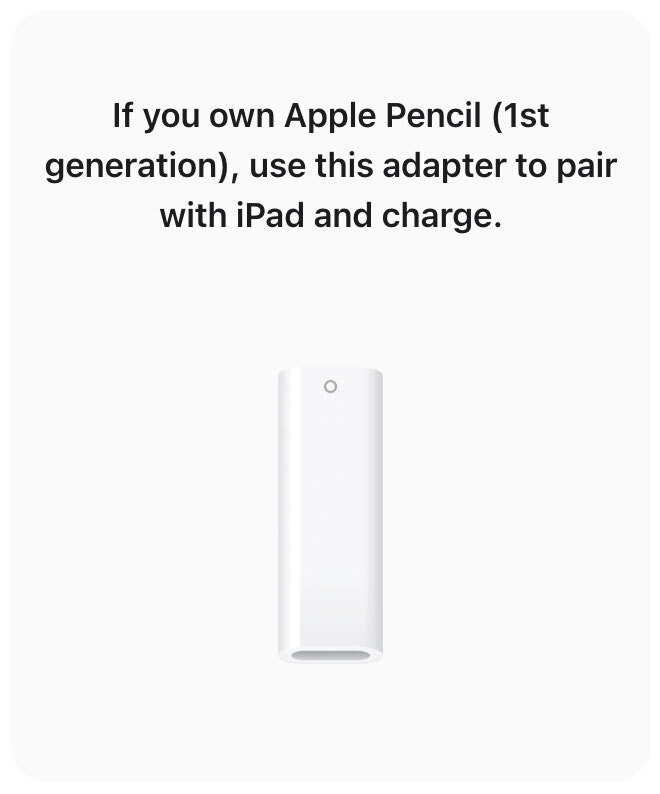| | These dongles, for the early word processor Wordcraft, are very likely the first dongles distributed under that name. (Mike Lake/Wikimedia Commons) Let’s briefly investigate a claim that a British company coined the word “dongle”In the early months of 1982, a man named Mike Lake wrote a letter to the British magazine Personal Computer World making a claim that he and his colleagues invented the word “dongle” in the context of computers. I am going to publish the letter in full here under fair use and comment: Dongles v thingiesI have noticed over the past few months that the word ‘dongle’ has been appearing in many articles with reference to security systems for computer software. Before the word abandons its inverted commas and formally enters the buss-word dictionary of computing, I would like to stake a claim as cooriginator of the term. At a meeting held about 18 months ago in the development department of Analog Electronics of Coventry, Peter Dowson, author of Wordcraft 80, Graham Heggie, managing director of Analog and myself, spent a pleasant hour devising the ‘thingy’ that we were to use to protect Wordcraft 80. When the device had been designed the conversation went something like this: Graham: ‘What are we going to call this dongle thingy?’ (Dongle being Graham’s word for anything without a name, or for anything whose name had been temporarily mislaid!) Peter & myself: ‘That will do—it’s a dongle.’ The three of us therefore claim to be the originators of the term as applied to computer protection systems. A regrettable side effect has been to deprive Graham of one of his favourite ‘whatsit’ words. We would welcome suggestions for a new word for him to use. Mike Lake, Derby
So, here we are with a credible claim very early in the history of the dongle that such a device had been invented and coined by a specific group of developers. And there is evidence, including of the photographic and journalistic kind, that this software both existed, and that it shipped with a dongle. It was published by a popular magazine for enthusiasts during the era, a magazine that itself only published the word “dongle” for the first time just three months prior: Now there are some neat ways to protect software. Unfortunately, these are nearly always in addition to the above (no-source code, the contract clause, officious documentation/upgrade service, program copy booby traps). The fashionable thing to do today is to use a ‘dongle’; you buy a small box to fit on the cassette port for each machine you want to run your package on and you can make as many copies of the software as you need. It is a much better solution than the PROM chip that came with some earlier products which got bent if you kept picking it in and out of the printed circuit board.
It is highly probable that Lake saw this article and decided to mail in a reply, just to make sure others were aware that the evidence had been set aside. After all, he wanted it noted for the historic record—which makes sense, given how popular the dongle became! | | If you believe that you invented something important, always send a letter to the editor to a magazine relevant to that field. It will come in handy decades later when people are trying to verify your claim. But there are even stronger pieces of evidence supporting the claim that appeared in magazines of the period—particularly in the pages of Byte in October of 1981, a story which covered the discussion of software piracy in the United Kingdom, a significant enough issue in this market that the story ran over eight separate pages. The piece is written in such a way that, even though it is about the topic that the dongle is related to, the device itself is briefly mentioned and treated as extremely novel: The case of Microchess shows how severely amateur copying can damage software sales. Before the International PET Users’ Group published a method of copying Microchess, the game program had sold more than 100,000 copies. After publication of the copy method, sales dried up. By contrast, the semi-professional program Wordcraft enjoyed a dramatic increase in sales when the protection routine known as the “Dongle” was incorporated.
But despite being a fairly long piece about software piracy in the U.K., the dongle is only mentioned once, implying the concept was not widespread at the time. The dongle is also mentioned in a review of Wordcraft that was published in September of 1981 in Commodore Club News, a review that also independently mentions Dawson and Lake, offering a degree of verification that the two did work on the software separate from the first-party claim that was sent in via a letter to the editor 40 years ago. The other half of this discussion is confirming that the term has not seen prior use in relation to computing. To be clear, they have not claimed to have invented the hardware-based copy protection scheme in that letter, but the terminology tied to it, and I will be looking with that in mind. I have researched the word in a number of major sources, including Newspapers.com archive, the Newsbank archive, Google Patents, and numerous other sources. Looking at mainstream non-specialist sources, the first mention I find of dongles is in a British newspaper, The Guardian, in 1983, in an article about computer piracy: On the business side, dongles—devices which enable the computer to read the particular program it guards and make copies worthless because they cannot be used without it—have been successful but they have added costs and, more importantly, they have taken an expansion port that could be used for something more useful to the user. And, again, there was a man who made a multi-purpose dongle …
It took a while for the term to take off outside of technical circles. It first appeared in an American newspaper in 1984; the first mention of the term in The New York Times in any topic related to computers is in 1995. The circumstantial evidence is strong that the term emerged from the British computing market in the early ’80s, then went global—which supports the claim that “dongle” was invented by the makers of Wordcraft. So why am I writing this? Well, after I found the letter-to-the-editor with the initial claim, I decided to check in on it because I had never seen this claim before, and in that process, I ran into the Wikipedia talk page for “Dongle,” where I spotted a rough-and-tumble 2019 debate regarding the word’s origin, with a user named Trusley Mike, who appears to be the same Mike Lake I quoted above, sharing a lot of evidence that was clearly primary-source in nature, but then running into the gauntlet of the “editor who felt the contributor was too close to the material.” The fatal mistake he made is summed up in a comment Lake included on the piece: “All definitions are made up by someone so I made up one and invited comments.” | | Wordcraft was a popular piece of software that included a dongle. It was very likely the first to include a device called a dongle. (Bitbarn) Looking at Lake’s own website, which includes some sharp criticism of Wikipedia, he only mentions one of these sources despite having clearly researched evidence of this. The challenge is that first-party research doesn’t really hold water in a world of verifiable sources, so he needs someone else to tell this story, which obviously matters because dongles are everywhere. So, as Tedium is a frequently-cited reliable source on Wikipedia that has discussed the topic of dongles in depth multiple times, let me clear up the debate: There is no evidence that the term “dongle” was used in context to the computer prior to Wordcraft’s adoption of the term and I would argue that their claim to having invented the term in this context is realistic and credible. While others might have used hardware protection schemes, none of them used the term “dongle” to describe it, and there is limited etymology to suggest a direct connection between dongles and computers before Wordcraft. As a professional journalist, I would recommend to those with significant historical claims of this nature to not directly edit Wikipedia themselves, but to talk to a journalist or academic researcher who is not connected to the original device in any way, who can help to uncover third-party research that verifies your contribution to history. They can help separate wheat from chaff and help build verifiable evidence that you were early, if not first—and help you avoid an edit war that seems designed to make you feel terrible about your life’s work. Sometimes, a layer of objectivity is what is necessary to ensure what you say is verifiable. |
|
